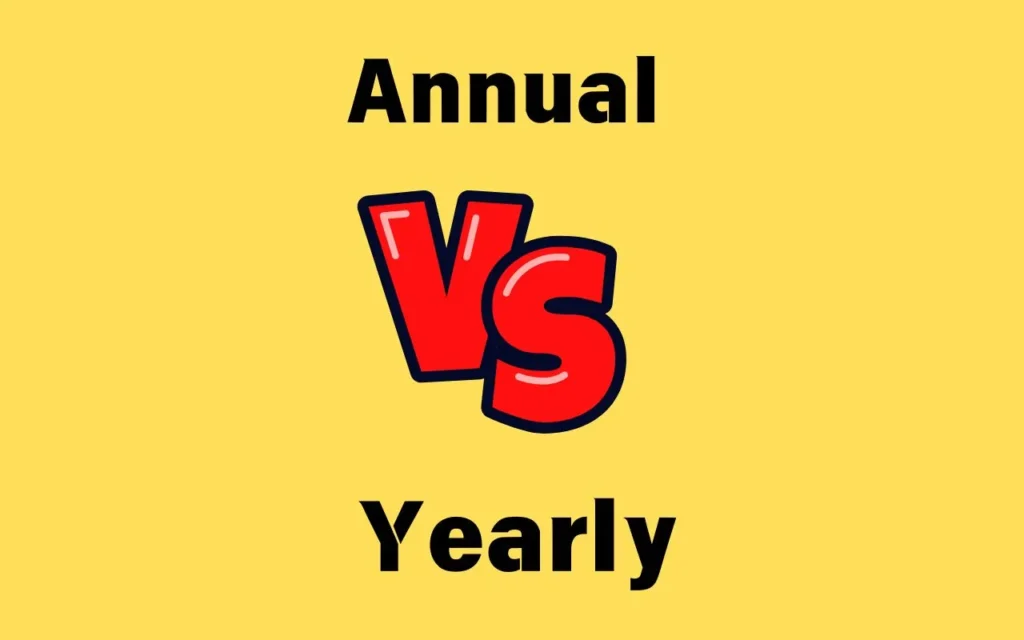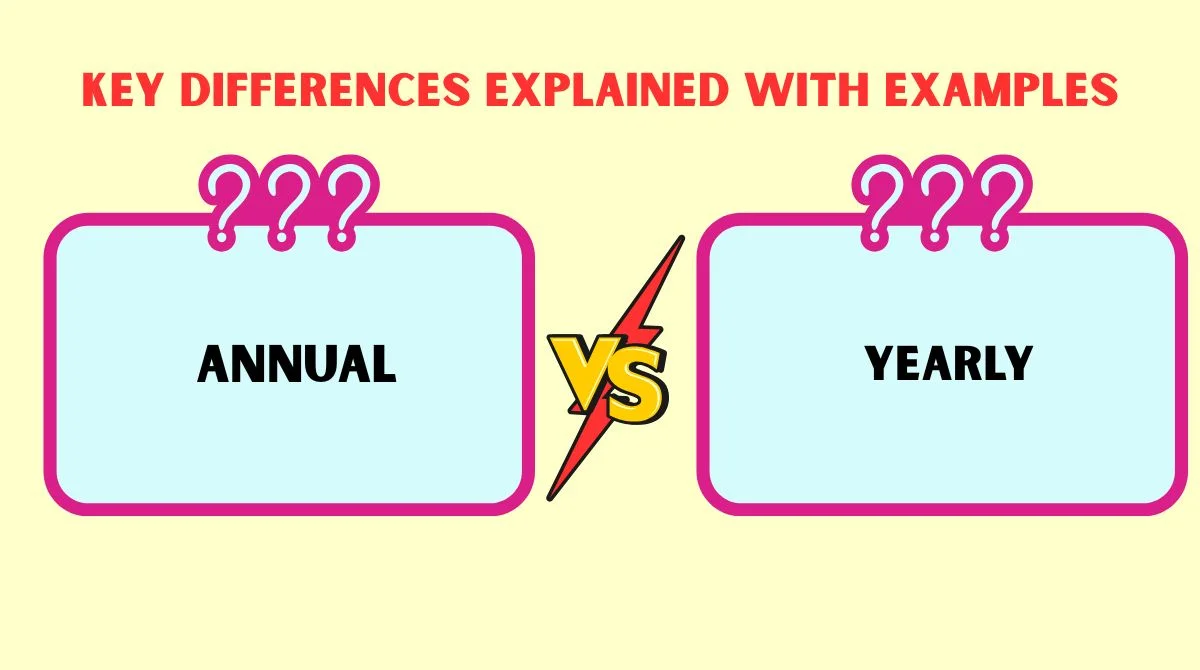Last updated on September 26th, 2025 at 01:49 pm
Language often throws curveballs at even fluent speakers. Words like annual, yearly, and every year look interchangeable, yet each one carries unique tones, contexts, and subtle differences.
Writers, students, and professionals alike ask the same question: Which one should I use?
The short answer?
- Annual is formal and often tied to events or official reports.
- Yearly is more flexible, slightly less formal, and often relates to recurring schedules.
- Every year is conversational, plain, and best for emphasizing frequency.
But there’s a lot more to it than that. In this article, you’ll get a full breakdown with clear definitions, practical examples, usage tips, comparisons, and even common mistakes people make with these words.
Breaking Down the Core Question

When someone says, “We have an annual meeting” and another person says, “We meet yearly”, both sound correct. Add “We meet every year” into the mix, and things get blurry.
The confusion exists because all three refer to something happening once in a year, yet they differ in:
- Formality – some are used in formal reports, others in everyday talk.
- Grammar – one is a single word, another a phrase, and another has both adjective and adverb forms.
- Context – you won’t call your family barbecue an annual report, but you might call it an annual barbecue.
Here’s a quick at-a-glance table to set the stage:
| Word/Phrase | Formality | Common Contexts | Example Sentence |
|---|---|---|---|
| Annual | High (formal) | Events, reports, publications | “The company hosts an annual conference.” |
| Yearly | Medium (neutral) | Bills, subscriptions, habits | “The magazine offers a yearly subscription.” |
| Every year | Low (informal) | Conversations, traditions, storytelling | “We visit our grandparents every year.” |
What Does “Annual” Mean?
The word annual comes from the Latin annus, meaning “year.” It refers to something that happens once a year or lasts for a year.
Key traits of “annual”:
- More formal than “yearly.”
- Frequently used in official, academic, or professional settings.
- Common in names of events: annual report, annual meeting, annual award show.
Examples:
- The school holds its annual science fair each March.
- Investors eagerly read the company’s annual report.
- The city’s annual marathon draws runners from around the world.
Grammatical Role:
- Adjective: “The annual conference attracted 5,000 attendees.”
- Noun (less common): “Perennials last multiple seasons, while annuals bloom once a year.”
Annual is best when you want a polished, professional tone or when naming something that repeats on a yearly schedule.
What Does “Yearly” Mean?
The word yearly is simpler and more neutral than “annual.” It conveys the same meaning—something that happens once per year—but it lacks the formality of “annual.”
Key traits of “yearly”:
- Slightly less formal than “annual.”
- Often used in business, everyday life, and finance.
- Works well when describing recurring schedules, payments, or habits.
Examples:
- My insurance premium is billed yearly.
- We take a yearly family trip to the beach.
- The yearly rainfall in the region averages 40 inches.
Grammatical Role:
- Adjective: “She made a yearly donation to the charity.”
- Adverb: “The flowers bloom yearly in the spring.”
While “annual” sounds polished, “yearly” feels straightforward. It’s the word you’d use in contracts, everyday writing, or when discussing recurring actions without formal naming.
What Does “Every Year” Mean?
Unlike the first two, every year is a phrase rather than a single word. It’s direct, clear, and very conversational.
Key traits of “every year”:
- More informal than “annual” or “yearly.”
- Common in storytelling, traditions, or casual speech.
- Focuses on frequency, not naming events.
Examples:
- We decorate the house together every year.
- The town floods every year during monsoon season.
- He forgets my birthday every year without fail.
This phrase is easy for learners and everyday speakers because it avoids formality. However, it’s usually not the best choice in professional documents or official reports.
Comparing “Annual” vs “Yearly” vs “Every Year”
Now let’s line them up side by side:
| Aspect | Annual | Yearly | Every Year |
|---|---|---|---|
| Formality | High (official, academic) | Medium (neutral) | Low (casual, conversational) |
| Tone | Polished, professional | Neutral, simple | Friendly, informal |
| Grammatical Role | Adjective, noun | Adjective, adverb | Phrase |
| Common Uses | Reports, events, publications | Payments, contracts, habits | Traditions, casual speech |
| Example | “Annual report” | “Yearly subscription” | “Every year we travel” |
Quick Takeaway:
- Use annual when naming formal events or writing professional documents.
- Use yearly when describing recurring things without formality.
- Use every year when speaking casually or telling stories.
Example Sentences in Action
Using “Annual”
- The United Nations releases an annual report on climate change.
- Her promotion was announced at the company’s annual dinner.
- The museum’s annual exhibit focuses on modern art.
Using “Yearly”
- We make yearly updates to our software.
- The landlord collects yearly maintenance fees.
- He schedules a yearly check-up with the doctor.
Using “Every Year”
- We bake cookies together every year on Christmas Eve.
- The same mistake happens every year during tax season.
- She volunteers at the shelter every year without fail.
Common Variations and Confusions
Annual vs Annually
- Annual = adjective (The annual meeting was held in June.)
- Annually = adverb (The company meets annually to discuss profits.)
Both are correct, but they play different grammatical roles.
Yearly vs “Yearlies”
Some learners mistakenly say “yearlies” to mean annual events or bills. This is incorrect. Stick to “yearly” as either an adjective or an adverb.
Every Year vs Each Year
- Every year emphasizes repetition (It rains every year without fail.).
- Each year highlights individual instances (Each year brings new opportunities.).
Both are correct, but “each year” often sounds slightly more formal.
Practical Usage Tips for Writers and Speakers
Here’s how to decide which word or phrase works best in your sentence:
- Ask yourself the context.
- Writing a report? → Use annual.
- Describing a subscription or payment? → Use yearly.
- Talking casually with a friend? → Use every year.
- Check the tone.
- Annual = professional and polished.
- Yearly = clear and straightforward.
- Every year = simple and conversational.
- Think about grammar.
- Need an adjective? → Annual report / yearly subscription.
- Need an adverb? → Meet annually / renew yearly.
- Need a phrase? → We celebrate every year.
Case Study: Business vs Casual Writing
Imagine two different contexts:
1. Business Report
- “The company hosts an annual general meeting where shareholders vote.”
Using “annual” fits here because it signals formality and professionalism.
2. Conversation Between Friends
- “We go camping every year in the summer.”
This version feels natural in everyday speech and storytelling.
3. Personal Finance Blog
- “Switch to a yearly subscription and save 20% compared to paying monthly.”
Here, “yearly” balances clarity with a practical, reader-friendly tone.
🙋 FAQs
What is the difference between annual and yearly?
Annual is more formal and often used in reports or events, while yearly is neutral and commonly used for payments, habits, or schedules.
Can I use every year instead of yearly?
Yes, but every year is more conversational, while yearly works better in business, contracts, and formal writing.
Is annual the same as annually?
No. Annual is an adjective (annual meeting), while annually is an adverb (meet annually).
Which is more formal: yearly or every year?
Yearly is more formal than every year, but less formal than annual.
When should I use annual instead of yearly?
Use annual for formal reports, events, or publications, and yearly for recurring bills, subscriptions, or neutral contexts.
What is the difference between every year and each year?
Every year emphasizes repetition, while each year focuses on individual yearly occurrences. Both are correct.
Conclusion
While annual, yearly, and every year all describe once-a-year occurrences, they aren’t identical.
- Annual is formal and professional—perfect for reports, events, and official documents.
- Yearly is versatile and neutral—great for payments, schedules, or habits.
- Every year is conversational—ideal for storytelling and everyday use.
By understanding these distinctions, you can choose the right term for the right audience. Whether you’re drafting a business report, writing a casual blog, or just chatting with friends, the right word choice adds clarity and impact.
